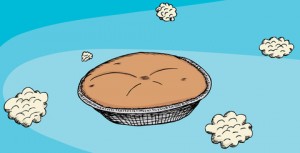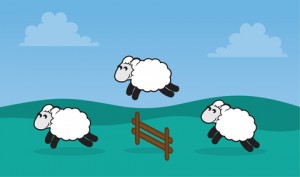Writers Beware: Idioms, Malapropisms, and Other Funny Expressions
 We (Edith Hope Fine and Judith Josephson) are the Grammar Patrol. Both of us taught for years and are now writers, with thirty plus books between us, including our two popular grammar guides, Nitty-Gritty Grammar and More Nitty-Gritty Grammar. For close to twenty years, we taught writing and grammar basics and now we blog about grammar for writers.
We (Edith Hope Fine and Judith Josephson) are the Grammar Patrol. Both of us taught for years and are now writers, with thirty plus books between us, including our two popular grammar guides, Nitty-Gritty Grammar and More Nitty-Gritty Grammar. For close to twenty years, we taught writing and grammar basics and now we blog about grammar for writers.
For those new to English, many expressions pose puzzling challenges. Can something really “drive you up a wall”? Read on.
Idioms
Idioms are expressions with understood meanings, but are figurative, not literal.
In our neck of the woods, we’re pleased as punch when it rains cats and dogs.
Our gerbil kicked the bucket.
We burn the midnight oil.
The Cabbage Patch doll was a flash in the pan.

Your optimistic grandmother may have a pie-in-the-sky attitude.
Actress Blythe Danner has worked “Break a leg!” into an osteoporosis drug ad.
I’m under the weather.
Sports idioms have crept into everyday communication:
They’re out in left field.
Mosley got it straight from the horse’s mouth.
Let’s touch base on Tuesday.
Idioms abound in work settings:
Our design team thinks outside the box.
The comptroller is crunching the numbers.
Bubba LaRue is climbing the corporate ladder.
Beef up your resume.
As an added challenge, idiomatic expressions can change, especially in “teen speak.” “I could be up with that” once meant you liked an idea. Now it’s “I could be down with that.” Go figure!
As Ziva from TV’s popular NCIS perfects her English, her idiomatic mismatches amuse her colleagues: “Stay focused on the job in my hand” or “You are a broken tape, Gibbs.” She was “close, but not cigar”; she meant “job at hand” and “broken record.”
Malapropisms
 The term malapropism refers to slip-ups, inappropriate word combinations. In 1775, Richard Sheridan popularized the term in his play The Rivals. His character Mrs. Malaprop referred to “alligators” as “allegories on the banks of the Nile.” She meant “pinnacle” when she said, “He is the very pineapple of politeness!”
The term malapropism refers to slip-ups, inappropriate word combinations. In 1775, Richard Sheridan popularized the term in his play The Rivals. His character Mrs. Malaprop referred to “alligators” as “allegories on the banks of the Nile.” She meant “pinnacle” when she said, “He is the very pineapple of politeness!”
In the comic strip Crankshaft, malapropisms fly from the cranky octogenarian’s mouth, as when he calls football’s key players “a bunch of overpaid quarterbucks.”
And in the totally teenage Zits comic strip, Jeremy’s girlfriend says she loves, “Eggs Benedick with Holiday sauce” for Benedict and Hollandaise.
More malapropisms:
She’s a rebel rouser. (rabble)
Devoted to his wife, Mr. Quigley has always been monotonous. (monogamous).
Olivia’s suitor drove erotically. (erratically).
Funny Expressions

Ever “count sheep”? “Push the envelope”? Agree to a change “across the board”?
The fascinating Phraseology by Barbara Ann Kipfer lets you in on how such expressions came into being. “Counting sheep” may have come the sound-alike words “sleep” and “sheep.” “Pushing the envelope” came from an aviation term meaning when a pilot pushes an aircraft beyond its reasonable capacity.
“Across the board” evolved from horseracing, where the board displays the odds in a race. “Throw your hat in the ring,” now used in politics, dates back to early boxing days when all you had to do to get into a match was to throw one’s hat into the boxing ring.
From 2500 years ago, “eat your heart out” goes back as far as Diogenes Laertius who credited Pythagoras with saying “Do not eat your heart”—meaning “Don’t wasted your life worrying about something.”
If, like us, you’re a logophile—a lover of words, check out public radio’s A Way with Words for delicious language romps with logophilic hosts Martha Barnette and Grant Barrett.
Summing up, if you’ve forgotten your anniversary or a loved one’s birthday, you might have to eat crow. But the rule of thumb for idioms, malapropisms, and other odd or amusing expressions is this: When in doubt, look it up.
Please Share
We’ll be over the moon to hear from you. Let’s touch base next month on other language mysteries and conundrums. For now, please share idioms, malapropisms and other expressions you have dealt with in your writing, your reading, or your daily life.
Tags: confusing expressions, Edith Hope Fine, English language, idiomatic, idioms, Judith Josephson, malapropisms, The Grammar Patrol
April 9th, 2013 at 9:14 am
Good post! Have you seen this Twitter account? https://twitter.com/StealthMountain It alerts people who use “peak” instead of “peek” in the phrase “sneak peek”. What would this be? A malapropism of the written word? Overall, it’s good for a laugh.
April 9th, 2013 at 7:08 pm
Loved these Edith. So true. A few more: slept like log, money burns a hole in my pocket. Those are two of my favorites.
May 14th, 2013 at 9:28 am
Hi, Donna,
Re peak/peek/pique–those are homophones. Homo = same, phone = sound. They may sound the same but are way different. We have a fit of pique when we peek and an incorrectly spelled mountain peak!
Nancy Jane, Other idioms that drive second-language learners wild: “pull strings,” “flash in the pan,” ” sell like hotcakes.” Another malapropism from More NGG: “Olivia’s suitor was driving erotically.” Woo-woo!